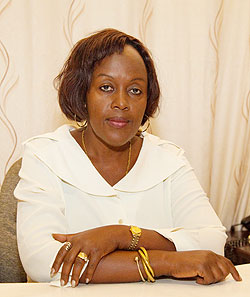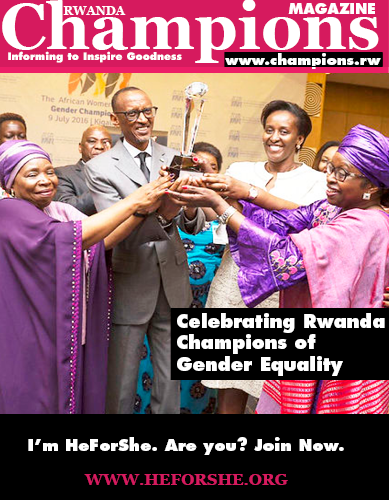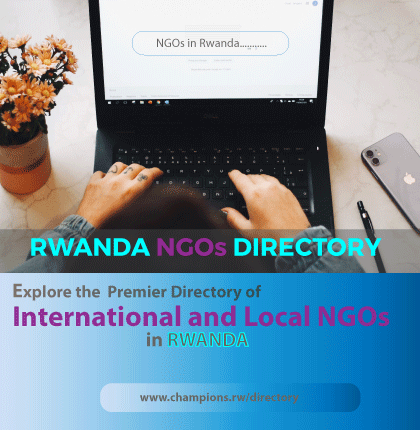UN Women Rwanda launches $6.3 million plan to boost women’s empowerment
UN Women Rwanda has launched a new four-year strategic plan that will require about $6.3 million to expand programs (…)

By Annie Kairaba
Rwanda is one of the most progressive countries in Africa in terms of gender equality and women’s rights. After the 1994 genocide against the Tutsi, the government led by the Rwanda Patriotic Front (RPF) prudently decided to make this a priority during the rebuilding process by establishing laws that protect the rights of women and emphasize the importance of gender equality in social and economic development. Rwanda was among the first countries to enact a law that provides for equal inheritance rights for the girl and boy child, law N° 22/99 of 12/11/1999.
For years, Rwanda has been committed to fighting poverty and promoting peace and security, as exemplified through the initiation of development programs geared towards these goals (RISD 2012: The Impact of Land Lease Fee on Landowners: Rwanda Case Study).
One of these programs is the Land Tenure Regularization Program (LTRP), which is intended to strengthen tenure security, promote investment in land and contribute to poverty reduction for about 80% of Rwandans depending on land for their livelihood - over 90% being women.

Annie Kariba, Director of RISD.
Rwanda Initiative for Sustainable Development (RISD), a civil society organization operating in Rwanda since 1997, has the goal to contribute to the effectiveness of land reform in Rwanda in a way that promotes gender equality, poverty reduction and sustainable peace. To achieve this, RISD work through networks to strengthen her advocacy and lobbying towards the protection of women’s land rights.
In particular, since 2000, RISD hosts and coordinates LandNet Rwanda Chapter - a network of more than 35 civil society organizations working on land rights issues in Rwanda. This network has successfully influenced Rwanda land related policy for the equal land rights of women as that of men.
Since 2003, RISD has influenced policymakers on two major gender related issues: (1) influenced the land policy to state that ‘land is an inheritable property, and women have equal inheritance right as that of men’. Prior to this advocacy work of LandNet, the draft land policy stated that, ‘as related to inheritance, refer to the family law of 1999’, yet the family law only referred to the land policy which even didn’t exist.
Today, Rwanda has made a world record of legally allowing single women to own land at 100%; and for married women at 50%, making equal land rights as single men and married men, respectively. Whereas in other countries in the region, women are still demanding a land right of 30% only. This is why recently His Excellency, Paul Kagame, the President of Rwanda was honored with a Gender Cup, in recognition of the Rwandan record in his championship in promoting the women’s rights.
Official statistics show that women account for 53% of the current population in Rwanda (10,762,085), and women (GoR 2012) head more than a quarter (27.7%) of all Rwandan households. There are also more women (81.9%) than men (61.3%) who are agricultural and fishery workers. These figures underscore the crucial role women play in economic development considering the fact that agriculture is the primary industry in Rwanda.
The Rwanda land reform is implemented through the legal framework known as Land Tenure Regularization Program (LTRP), understood as one of the most ambitious land reforms in Africa aimed at registering every piece of land through individual titles. The LTRP is not just concerned with the titling process, but is explicit in its intention to also transform women’s access to land.
Before LTRP, women had no land rights in Rwanda, including the lack of control and ownership over land. Even in cases of legally married couples, a wife was not entitled to inherit land after the death of her husband. Instead, a brother of the deceased husband was to become the owner of the land, or marry the widow and manage the land. In some cases, the widow was allowed to manage the land herself until a son became mature enough to manage it.
These patriarchal settings denied women’s rights, which in turn hindered their social economic development (RISD and Shearer 2016: Women and Land Rights in Rwanda; (RISD and ILC 2016: RISD’s intervention in pro-poor land policy implementation in Rwanda).
It is important to note that like elsewhere in the World, although not its intention, the LTRP has resulted in revealing underlying family disputes, at times seen as LTRP causing family disputes. What has happened is that this reform challenged the cultural norm where only men owned land or only men could make decisions on the use of land thus it triggered these conflicts with men trying to fight back for the control.
It is therefore important to recognize that equality and empowerment of women has triggered family disputes, where men tend to resist from such change, combined with the increased value of land, as land became registered.
The recent record shows that majority of land related disputes registered are family related and over 80% relating to women. The intervention of RISD to cab down these disputes has been to introduce a ‘Securing land disputes management program’, launched in 2012 with the aim to promote mediation, as opposed to formal courts that is too technically complicated and too costly for most women.
Through this program, RISD also gathers reliable data on land related disputes through Action Research, as a support to policy change. In support of Mediators (Abunzi), RISD has introduced a web portal where post data instantly for monitoring and analysis, for quicker action as over 80% of disputes reported to Abunzi are inheritance land related, hence concerning women.
The author is the Director of Rwanda Initiative for Sustainable Development (RISD)
UN Women Rwanda has launched a new four-year strategic plan that will require about $6.3 million to expand programs (…)
UN Women Rwanda has launched a new four-year strategic plan that will require about $6.3 million to expand programs (…)
African women leaders are calling for greater solidarity and collaboration to help more women attain leadership (…)
Women for Women International (WfWI) has appointed Nigerian development expert Thelma Ekiyor as its new global chief (…)

